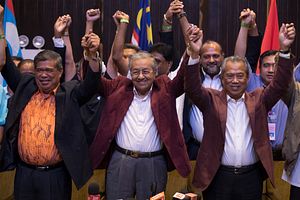While the general understanding following the shock victory of Malaysia’s opposition during elections last May was that power would be handed over from returning prime minister, Mahathir Mohamad, over to his former deputy prime minister turned opposition leader turned prime minister in waiting Anwar Ibrahim, in around two years or so, there has continued to be uncertainty about if and when this will occur. As we get further away from the election results last year and closer to the expected transition itself, one can expect such questions to linger amid wider complexities in the evolution of the country’s politics out to its next general elections expected sometime around 2023.
The idea of a transition itself is quite a new one for Malaysia in terms of its politics. Since the country was formed back in 1963, it has only had six prime ministers, all coming from the United Malays National Organization (UMNO), within which Mahathir’s time in power has comprised about two-fifths of Malaysia’s contemporary political history. And though UMNO has governed the country since independence, tensions within the party have been quite significant, especially during Mahathir’s rule. In the late 1980s, Mahathir had to stave off a serious leadership challenge from within UMNO in order to remain in power. In the late 1990s, Mahathir sacked and then jailed Anwar, who had been his deputy prime minister, over what some have termed trumped-up sodomy charges.
With all this in mind, it is fair to say that the worries about the current Mahathir-Anwar transition are not entirely unfounded, even if the circumstances this time are quite different. This time around, Anwar and Mahathir had formed an opposition Pakatan Harapan (PH) coalition outside of UMNO against then-Prime Minister Najib Razak ahead of the 2018 general elections, with the former having rebranded himself as an opposition leader following his imprisonment, and the latter quitting UMNO and forming a separate party citing disaffection with Najib’s policies. Both men and others have referred to an agreement reached which, in general, would see Mahathir hand over power to Anwar and see him ascend to the premiership, likely in two years or so.
While there is often an overemphasis on personality politics, it bears reminding that this so-called transition has greater significance for scholars and experts who observe Malaysian politics. In particular, the dynamics of transition are occurring amid a key question in the minds of observers about whether the opposition win last May will end up being a one-off affair with UMNO returning to power in the next election or whether we will see a longer period of rule under the Pakatan Harapan government. Embedded in that question is a secondary inquiry about whether a ruling party under Anwar, as opposed to Mahathir, can secure such a win, in part because the opposition had previously been unsuccessful at winning power before 2018. How exactly all this plays out will obviously also have effects on Malaysia’s broader foreign and defense policy as well.
Thus far, the parties concerned have publicly maintained at a general level that the transition is to go on as intended. Mahathir has repeatedly said he intends to honor the agreement to step aside, and he did so again last month during his party’s annual general assembly. Anwar, for his part, has also said that he has faith that the promise will be upheld and called for Mahathir to be given space to govern up to that point, even as he has been speaking up more directly and separately on domestic and foreign policy issues since he was officially sworn in as a member of parliament in October last year after a by-election win in Port Dickson. At a more general level, it would also be rather simplistic to assume that 2019 will see a 1999-like scenario again between Mahathir and Anwar, where an expected transition is once again derailed. As I have observed before in these pages, there is a lot that has changed since then: about Malaysia, about the position of both men, and about the country’s political dynamics.
Yet, similarly, it would also be premature to just assume that a general agreement means that the transition will take place in a specific way that satisfies all parties. For one, irrespective of what Mahathir and Anwar themselves think, there have already been rumblings of discontent among parts of their parties over not just the succession issue, but how power is being shared and how priorities are being shaped. The position of the new PH government is also still quite fragile, and as we have seen in many cases in politics, as Malaysia moves further away from the shock election last May, the focus will shift increasingly from righting the wrongs of the previous government of Najib Razak to judging the current government on its own record. That judgment will also occur relative to broader political dynamics, including UMNO, which is in the process of reconstituting itself amid political realignments in the coalitions that may shape up for the next election.
While the dynamics of the so-called Mahathir-Anwar transition may become more certain in the months that follow, for now, a lot still remains unclear. As long as that persists, we can expect continued scrutiny on the words and actions of the country’s prominent figures, including Mahathir and Anwar themselves, as observers seek an understanding of how that transition will actually evolve and what that means for the country’s domestic and foreign policy moving forward.

































